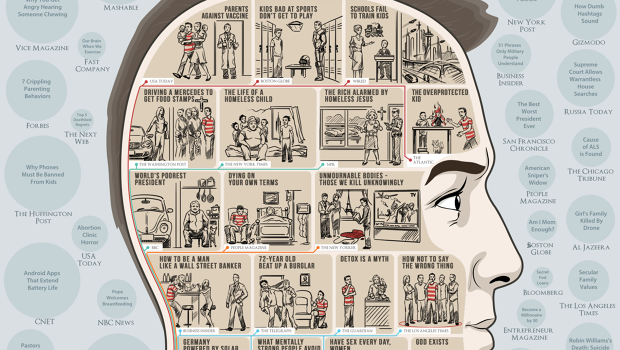If you read David Plotz’s goodbye letter from Slate a while back, you might assume that all that matters on the Internet is memes and funny (or animal) pictures. (Hell, if you’ve ever been on the Internet for 45 or so minutes at a time, you might assume the same thing.) In reality, that’s not the case. This group called Funders and Founders partnered with another group called ahrefs to basically figure out the “most-shared” articles from major websites, then group them into themes. Here’s the whole thing. Kind of cool that someone did this, because at the broadest level, the Internet is the largest collection of data points in human history (right?) and the fact that you can pretty easily share anything from any website to your friends is a whole new layer.
There are caveats to anything in life, and there are caveats to this. The criteria they used to determine the “top” articles from the major websites were as follows:
- Have a large number of both likes and tweets
- Be an idea, not an event or person (can explain it in 1 tweet)
- Have a lot of comments (on the publisher’s site). Sticky ideas produce a lot of strong reactions, as judged by lengthy comments and the number of comments.
- Not be a video or a picture gallery (without text). If we factored in photos sets, cat memes, etc., they would win any day, but they don’t articulate and an idea.
So … that does leave out a lot of things, or potentially narrows the field of what will be included here. Still, when ahrefs ran all the linking data, the major themes were:
- Kids
- Being rich or poor
- Death
- Self-improvement
Wow.
Kind of a window into the soul of humanity there, no?
So again, we come back to this special place, right? There are essentially three things that most middle-class people hate to discuss, right?
- Sex
- Money
- Failure
Those three things, taken together, explain pretty much all of life. Best I can tell, you need to have sex to have kids. How much money you make, even if you don’t want to discuss it, determines whether you’re rich or poor. Death is, well, that’s a mystery. And failure is a regular part of the process of self-improvement — but we never talk about failure, especially at work.
Maybe it’s logical that the things people share and comment on the most line up with the concepts people usually don’t discuss in person, because the Internet gives you some degree of anonymity to chase the concepts you’re really interested in (see: pornography, emergence of). But it does remain kind of interesting that the concepts we’re never supposed to discuss — because it’s gauche, or you don’t talk about it, or whatever it is — are the ones that everyone seems to want to discuss.
